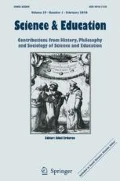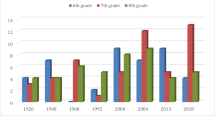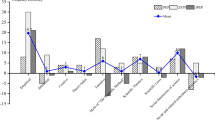Abstract
Science and mathematics are universal endeavors. However, the historical perspective of science and mathematics has been westernized across the curriculum in the USA. There is a limited number of textbook analyses centered on exploring the representation of science and mathematics under a historical standpoint. This research seeks to discuss the dominated historical viewpoints presented in the textbooks and uncover the untold historical perspectives of science and mathematics contributors from non-western regions. A discourse analysis of eleven science and mathematics textbooks published over the course of 10 years was examined under an ethnocentric and cultural imperialistic lens with a focus on the hidden curriculum. The findings reflect that science and math textbooks continue to exhibit male Eurocentric representations. This research offers counter-hegemonic discourses in the history of science and mathematics not present in the analyzed textbooks with the purpose of diversifying the scientific and mathematic historical content knowledge. By offering teachers and students with diverse perspectives of the history of science and mathematics, the curriculum becomes enriched with accurate knowledge that serves and represents all learners.
Similar content being viewed by others
Data Availability
Textbooks utilized for this research are readily available to the public at public higher education institutions. Details of the textbooks are located in Sect. 4, and are listed as references at the end of this manuscript.
References
Amr, S. S., & Tbakhi, A. (2007). Jabir ibn Hayyan. Annals of Saudi Medicine, 27(1), 53–54.
Atwater, M. M. (2010a). Multicultural science education and curriculum materials. Science Activities: Classroom Projects and Curriculum Ideas, 47(4), 103–108.
Atwater, M. M. (2010). Dr. Geneva Gay: Multicultural education for all disciplines. Science Activities: Classroom Projects and Curriculum Ideas, 47(4), 160–162.
Baker, D. (1998). Equity issues in science education. In B. J. Fraser & K. G. Tobin (Eds.), International handbook of science education (pp. 869–896). Springer.
Banks, J. A. (2015). Citizenship, global migration and education. In H. P. Baptiste, A. Ryan, B. Araujo, & R. Duhon-Sells (Eds.), Multicultural Education: A renewed paradigm of transformation and call to action (pp. 56–67). Caddo Gap Press.
Barba, R. H. (1998). Science: In the multicultural classroom (2nd ed.). Allyn and Bacon.
Bazzul, J. (2015). Tracing “Ethical Subjectivities” in science education: How Biology textbooks can frame ethico-political choices for students. Research in Science Education, 45(1), 23–40. https://doi.org/10.1007/s11165-014-9411-4
Bazzul, J., & Sykes, H. (2011). The secret identity of a biology textbook: Straight and naturally sexed. Cultural Studies of Science Education, 6(2), 265–286. https://doi.org/10.1007/s11422-010-9297-z
Beyer, M. & Apple, M. (Eds.). (1998). Values and politics in the curriculum. In The curriculum: Problems, politics, and possibilities (pp. 3–11). SUNY Press.
Boyer, C. B. (1944). Zero: The symbol, the concept, the number. National Mathematics Magazine, 18(8), 323–330. https://doi.org/10.2307/3030083
Boyer, C. B. (1991). A history of mathematics (2nd ed.). John Wiley & Sons Inc.
Boyer, J. B., & Baptiste, H. P. (1996). Transforming the curriculum for multicultural understandings: A practitioner’s handbook. Caddo Gap Press.
Braga, M., Guerra, A., & Reis, J. C. (2013). History of science, physics, and art: A complex approach in Brazilian syllabuses. Cultural Studies of Science Education, 8(3), 725–736.
Curran, F. C., & Kellogg, A. T. (2016). Understanding science achievement gaps by race/ethnicity and gender in kindergarten and first grade. Educational Researcher, 45(5), 273–282.
DeBuvitz, W. (2011). Adding a bit more history to science courses. Physics Teacher, 49(5), 282–283.
Good, R. (1995). Comments on multicultural science education. Science Education, 79, 335–336.
Green, W., & Naidoo, D. (2008). Science textbooks in the context of political reform in South Africa: Implications for access to science. Science Education International, 19(2), 235–250.
Guerra, A., & Braga, M. (2014). “The name of the rose”: A path to discuss the birth of modern science. Science Education, 23(3), 643–654.
Hodson, D. (1993). In search of a rationale for multicultural science education. Science Education, 77, 685–711.
Ideland, M. (2018). Science, coloniality, and “the great rationality divide”: How practices, places, and persons are culturally attached to one another in science education. Science & Education, 27(7–8), 783–803. https://doi.org/10.1007/s11191-018-0006-8
Jackson, P. W. (2009). The daily grind. In D. J. Flinders & S. J. Thornton (Eds.), The curriculum studies reader (pp. 29–36). Routledge Falmer.
Joseph, G. (2011). The crest of the peacock: Non-European roots of mathematics (3rd ed). Princeton University Press. https://doi.org/10.2307/j.ctt7sdsb
Ju, M. K., Moon, J. E., & Song, R. J. (2016). History of mathematics in Korean mathematics textbooks: Implication for using ethnomathematics in culturally diverse school. International Journal of Science and Mathematics Education, 14(7), 1321–1338. https://doi.org/10.1007/s10763-015-9647-0
Leite, L. (2002). History of science in science education: Development and validation of a checklist for analyzing the historical content of science textbooks. Science & Education, 11, 333–359.
Logan, R. K. (1979). The mystery of the discovery of zero. ETC: A review of general semantics, 36(1), 16–28.
Longino, H. (1990). Science as social knowledge. Princeton University Press.
Loving, C. (1995). Comment on ‘multiculturalism, universalism, and science education.’ Science Education, 79, 341–348.
Luke, A. (1989). Open and closed texts: The ideological/semantic analysis of textbook narratives. Journal of Pragmatics, 13, 53–80.
Morton, W. S., & Lewis, C. M. (2010). China: Its history and culture. World Publishing Corporation.
Mujawamariya, D., & Hamdan, A. (2013). Appropriately diverse? The Ontario science and technology curriculum tested against the Banks Model. Canadian Journal of Education, 36(4), 416–448.
Ndura, E. (2004). ESL and cultural bias: An analysis of elementary through high school textbooks in the Western United States of America. Language, Culture and Curriculum, 17(2), 143–153.
Ninnes, P. (2000). Representations of indigenous knowledges in secondary school science textbooks in Australia and Canada. International Journal of Science Education, 22(6), 603–617. https://doi.org/10.1080/095006900289697
Ninnes, P. (2001). Representations of ways of knowing in junior high school science texts used in Australia. Discourse: Studies in the Cultural Politics of Education, 22(1), 81–94. https://doi.org/10.1080/01596300120039777
Ninnes, P. (2001b). Writing multicultural science textbooks: Perspectives, problems, possibilities and power. Australian Science Teachers Journal, 47(4), 18–27.
Ninnes, P. (2002). Discursive space(s) in science curriculum materials in Canada, Australia and Aotearoa/New Zealand. Journal of Curriculum Studies, 34(5), 557–570. https://doi.org/10.1080/00220270110114081
Peterson, S. B., & Kroner, T. (1992). Gender biases in textbooks for introductory psychology and human development. Psychology of Women Quarterly, 16(1), 17–36.
Pinar, W. F. (2004). Autobiography: A revolutionary act. What is curriculum theory? (pp. 35–64). Lawrence Erlbaum.
Pingel, F. (1999). UNESCO guidebook on textbook research and textbook revision (pp. 9–11). Verlag Hahnsche Buchhandlung.
Popkewitz, T. S. (2009). Curriculum study, curriculum history, and curriculum theory: The reason of reason. Journal of Curriculum Studies, 41(3), 301–319.
Popkewitz, T. S. (2011). Curriculum history, schooling and the history of the present. History of Education, 40(1), 1–19.
Rajan, R. G. (1983). The first chemist. Journal of Chemical Education, 60(2), 126. https://doi.org/10.1021/ed060p126
Rezende, F., & Ostermann, F. (2020). Hegemonic and counter-hegemonic discourses in science education scholarship from the perspective of post-critical curricular theories. Cultural Studies of Science Education. https://doi.org/10.1007/s11422-019-09969-0
Rodriguez, A. J. (2007). “Science for all” and invisible ethnicities: How the discourse of power and good intentions undermine the National Science Education Standards. In M. Hines (Ed.), Multicultural Science Education: Theory, practice and promise (pp. 21–35). Peter Lang Publishing Inc.
Romanowski, M. H. (1996). Problems of bias in history textbooks. Social Education, 60(3), 170–173.
Slattery, P. (2013). Introduction to curriculum development, reconceptualization, and postmodernity. Curriculum development in the postmodern era (pp. 17–36). Routledge.
Sleeter, C. E., & Grant, C. A. (1991). Textbooks and race, class, gender and disability. In M. W. Apple & L. K. Christian-Smith (Eds.), Politics of the Textbook. Routledge.
Starck, J. G., Riddle, T., Sinclair, S., & Warikoo, N. (2020). Teachers are people too: Examining the racial bias of teachers compared to other American adults. Educational Researcher, 49(4), 273–284. https://doi.org/10.3102/0013189X20912758
Watson, J. D. (1968). The double helix. Atheneum.
Textbook Resources
Carter, J. A., Cuevas, G. J., Day, R., Malloy, C., Holliday, B., & Casey, R. (2012). Glencoe Algebra 2 (teacher). Glencoe/McGraw-Hill.
Charles, R. I., Illingworth, M., McNemar, B., Mills, D., Ramirez, A., & Reeves, A. (2013). Mathematics common core teacher edition course 1. NJ Pearson/Prentice Hall.
Charles, R. I., Illingworth, M., McNemar, B., Mills, D., Ramirez, A., & Reeves, A. (2013). Mathematics common core teacher edition course 2. NJ Pearson/Prentice Hall.
Charles, R. I., Illingworth, M., McNemar, B., Mills, D., Ramirez, A., & Reeves, A. (2013). Mathematics common core teacher edition course 3. NJ Pearson/Prentice Hall.
Ebbing, D. D., Gammon, S. D., & Ragsdale, R. O. (2006). Essentials of general chemistry (2nd ed.). Houghton Mifflin Company.
Hacket, J. K., Moyer, R. H., Vazquez, J., Teferi, M., Zike, D., LeRoy, K., Terman, D. T. J., & Wheeler, G. F. (2011). 4th grade Science a closer look. McMillan/McGraw-Hill.
Hacket, J. K., Moyer, R. H., Vazquez, J., Teferi, M., Zike, D., LeRoy, K., Terman, D. T. J., & Wheeler, G. F. (2011). 5th grade Science a closer look. McMillan/McGraw-Hill.
Hacket, J. K., Moyer, R. H., Vazquez, J., Teferi, M., Zike, D., LeRoy, K., Terman, D. T. J., & Wheeler, G. F. (2011). 6th grade Science a closer look. McMillan/McGraw-Hill.
Phillips, J. S., Strozak, V. S., & Wistrom, C. (2005). Chemistry: Concepts and applications. Glencoe/McGraw-Hill.
Wilbraham, A. C., Staley, D. D., Matta, M. S., & Waterman, E. L. (2005). Chemistry. Pearson Prentice Hall.
Zumdahl, S. S., & Zumdahl, S. A. (2003). Chemistry (6th ed). Houghton Mifflin Company.
Acknowledgements
The author would like to express her immense gratitude to Dr. Christine Sleeter for providing thorough feedback at the initial stages of the manuscript and to Ana Gabriela Chacón-Díaz for proofreading the manuscript.
Author information
Authors and Affiliations
Corresponding author
Ethics declarations
Conflict of Interest
The author declares no conflict of interest.
Additional information
Publisher's Note
Springer Nature remains neutral with regard to jurisdictional claims in published maps and institutional affiliations.
Rights and permissions
About this article
Cite this article
Chacón-Díaz, L.B. A Textbook Analysis to Uncover the Hidden Contributors of Science and Mathematics. Sci & Educ 31, 193–211 (2022). https://doi.org/10.1007/s11191-021-00246-7
Accepted:
Published:
Issue Date:
DOI: https://doi.org/10.1007/s11191-021-00246-7




